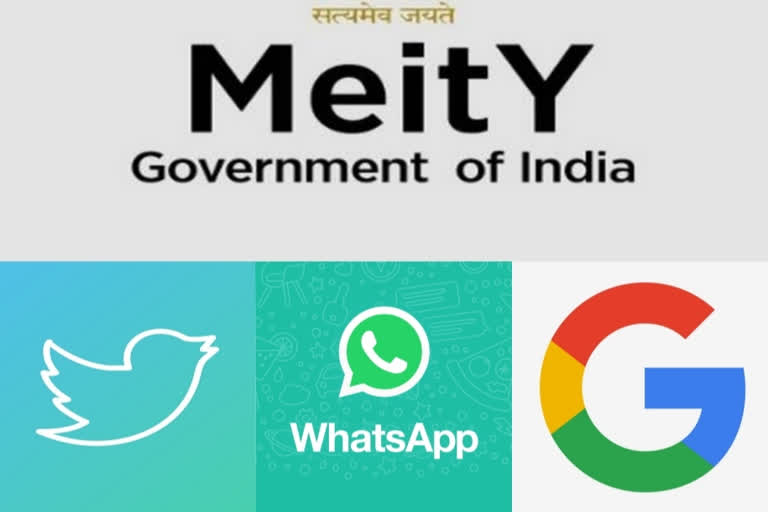New Delhi: As the Centre asked social media platforms to immediately report their status of compliance with the new IT rules, major companies such as Google, Twitter and WhatsApp have responded to the directive.
While Goolge CEO Sundar Pichai said the company is committed to complying with local laws and engages constructively with governments to keep pace with the fast-evolving technology landscape, Twitter requested the IT Ministry to consider a minimum of three-month extension for the implementation of the guidelines.
On the other hand, Facebook-owned WhatsApp has challenged the rules in the Delhi High Court saying the company will not share information related to the "first originator of information" with any government including India.
Twitter seeks three-month extension
Besides appealing to the Centre to publish detailed guidelines on the compliance of the new IT rules, the US-based tech giant sought three-month time to implement the rules.
"We urge the Ministry of Electronics and IT to publish these Standard Operating Protocols on procedural aspects of compliance for public consultation," Twitter said in a statement on Thursday.
We would request the Ministry to consider a minimum of 3 months extension in order for Twitter to implement the Rules, the statement added.
Read: ‘Intimidation tactics’ of Delhi Police a worry: Twitter
Google is committed to complying with local laws
Appreciating India's track record in maintaining open internet, Google CEO Sundar Pichai said the company will respect the local laws.
"It's obviously early days and our local teams are very engaged... we always respect local laws in every country we operate in and we work constructively. We have clear transparency reports, when we comply with government requests, we highlight that in our transparency reports," Google CEO Sundar Pichai said in a virtual conference with select reporters from Asia Pacific.
He added that the company respects the legislative processes, and in cases where it needs to push back, it does so.
"It's a balance we have struck around the world," he said.
Pichai noted that technology is touching society in deeper and broader ways and the landscape is evolving at a fast pace.
"So, we fully expect governments rightfully to both scrutinize and adopt regulatory frameworks. Be it Europe with copyright directive or India with information regulation etc, we see it as a natural part of societies figuring out how to govern and adapt themselves in this technology-intensive world," he said, adding that Google engages constructively with regulators around the world, and participates in these processes.
Traceability provision is unconstitutional: WhatsApp
Taking the privacy war to the Court, WhatsApp has sued the Indian government, saying that user privacy is in its DNA and the company will not share information related to the "first originator of information" with any government including India.
The Facebook-owned company further said the requirement of intermediaries enabling the identification of the first originator of information in India upon government or court order puts end-to-end encryption and its benefits "at risk".
Further, the company urged the high court to declare Rule 4(2) of the Intermediary Rules as unconstitutional, ultra vires and illegal.
It also sought that no criminal liability be imposed on it for any alleged non-compliance with Rule 4(2) which requires to enable the identification of the first originator of the information.
Read: WhatsApp users have nothing to fear: IT Minister on new IT rules
What are the amended IT rules?
The new Information Technology (Intermediary Guidelines and Digital Media Ethics Code) Rules, 2021 were announced by the government on February 25 and large social media platforms like Twitter, Facebook, Instagram and WhatsApp were asked to comply with the norms by May 25.
The new rules directed large social media platforms -- defined as those with over 50 lakh users in the country -- to follow additional due diligence, including appointment of chief compliance officer, nodal contact person and resident grievance officer.
Non-compliance with rules would result in these platforms losing their intermediary status that provides them immunity from liabilities over any third-party data hosted by them.
In other words, they could be liable for criminal action in case of complaints.
Read: India says it recognizes 'right to privacy' in WhatsApp row
(With Agency Inputs)



